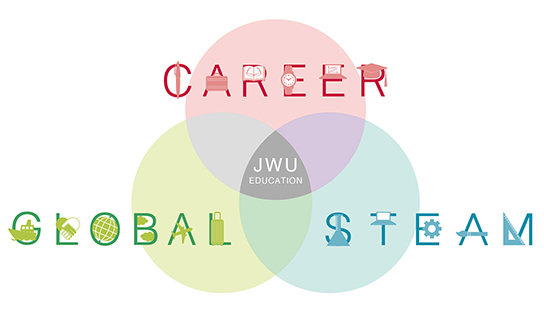- Diploma Policy (Master's Program)
- Curriculum Policy (Master's Program)
- Admission Policy (Master's Program)
- Diploma Policy (Doctoral Program)
- Curriculum Policy (Doctoral Program)
- Admission Policy (Doctoral Program)
Diploma Policy (Master's Program)
Knowledge and understanding
- Students will have a broad knowledge of Japanese literature, Japanese linguistics and related fields and acquire advanced knowledge in a specialized field sufficient to earn their master's degree.
Thinking and judgment
- Students will be able to explore various issues related to Japanese literature, Japanese linguistics and related fields with a scientific critical spirit and insight.
Interest, volition, attitude
- Students will have a deep interest in Japanese literature, Japanese linguistics and related fields, and be highly motivated to promote research in these fields.
Skills and expressions
- Students will be able to read and understand highly specialized literature and materials on Japanese literature, Japanese linguistics and related fields, acquire research and study skills, and contribute to society with accurate expression and communication skills.
Curriculum Policy (Master's Program)
Knowledge and understanding
- Students are required to write a master's thesis that meets the standards set forth in the University's degree regulations under individual guidance and based on a research plan.
- Lectures are offered to enable students to understand and acquire more advanced specialized knowledge in Japanese literature, Japanese linguistics and related fields.
- Lectures are offered to enable students to acquire the most advanced research results in each field.
Thinking and judgment
- Seminars are offered to enable students to learn how to find issues and solve them, and refine their thoughts.
Interest, volition, attitude
- Specialized subjects are offered in the various fields of each division to increase students' interest and motivation.
- Subjects on active learning are offered.
Skills and expressions
- Specialized subjects are offered to cultivate students' ability to present issues that have been spontaneously discovered and solved through specialized knowledge and skills.
Admission Policy (Master's Program)
Knowledge and understanding
- Students who have a desire to contribute to society with advanced expertise in Japanese literature, Japanese linguistics and related fields.
Thinking and judgment
- Students who want to deepen their thinking about their own work and way of life through thinking and judging about Japanese literature, Japanese linguistics and related fields.
Interest, volition, attitude
- Students who want to study in one of the fields of Japanese literature, Japanese language studies, and related studies.
Skills and expressions
- Students who want to contribute to society in various fields after completing the program by using their skills learned in the Division.
Diploma Policy (Doctoral Program)
Knowledge and understanding
- Students will have a broad knowledge of Japanese literature, Japanese linguistics and related fields and acquire advanced academic knowledge in a specialized field sufficient to earn their doctoral degree.
Thinking and judgment
- The ability to conduct original and independent research activities by further developing the research, analysis, and consideration skills developed in the first semester of the doctoral program.
Interest, volition, attitude
- Students will be able to conduct original and independent research activities by further developing the research, analysis, and consideration skills developed in the master's program.
Skills and expressions
- Students will be able to read and understand highly specialized literature and materials on Japanese literature, Japanese linguistics and related fields and present research results with accurate expression and communication skills, thereby contributing to the development of academics.
Curriculum Policy (Doctoral Program)
Knowledge and understanding
- As the culmination of research in each specialized field, students are required to write a doctoral dissertation that meets the standards set forth in the University's degree regulations under guidance based on a research plan.
- Lectures are offered for the acquisition and understanding of highly specialized knowledge of each specialized field.
- Lectures are offered to enable students to acquire knowledge of the most advanced research results in each field.
Thinking and judgment
- Seminars are offered to enable students to learn how to find issues and solve them, and put that thinking into practice.
Interest, volition, attitude
- Specialized subjects are offered in the various fields of each division to increase students' specialized interest and motivation.
- Subjects on active learning are offered.
Skills and expressions
- Specialized subjects are offered to demonstrate students' ability to present issues that have been spontaneously discovered and solved through specialized knowledge and skills.
Admission Policy (Doctoral Program)
Knowledge and understanding
- Students who can contribute to the development of academics using the specialized knowledge acquired in the master's program.
Thinking and judgment
- Students who want to deepen their thoughts obtained in their respective division and to gain insight into how to work and live as a researcher.
- Students who seek to earn their degree by deepening their academic thinking.
Interest, volition, attitude
- Students who want to continue their advanced and original research based on the expertise and research methods developed in the master's program.
Skills and expressions
- Students who aim for a career in research or education and want to contribute to society by applying the skills learned in the Division.

